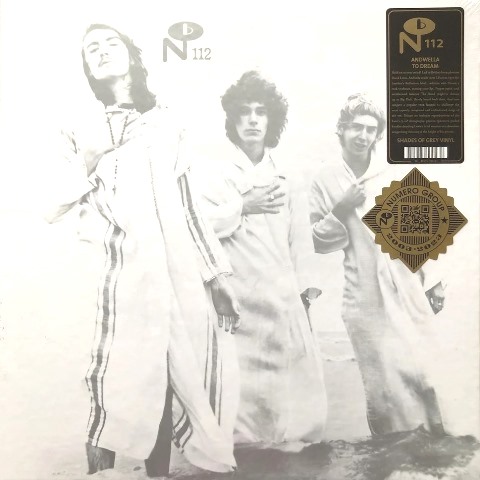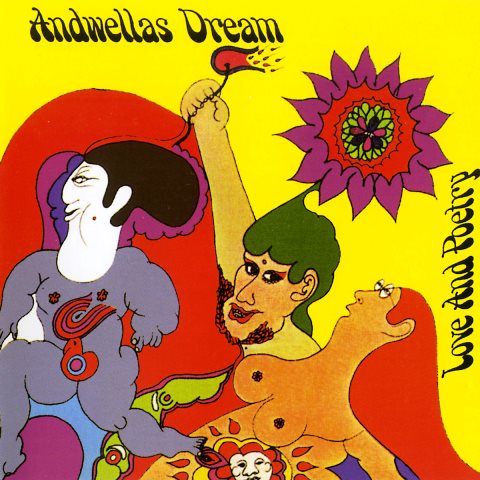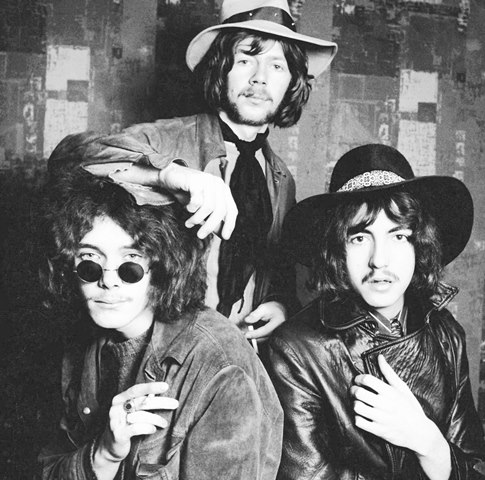Original pressings of Love And Poetry sell for up to £2,800. Copies of the August 1969 debut album by Andwellas Dream can sometimes also be found for £700, a relative bargain in the context of the upper limit of the prices the collector’s market has settled on.
There were two follow-up albums – each credited to Andwella. August 1970’s World's End fetches around £40 to £80; People's People, issued in late 1970, attracts prices of £50 to £100. Cult stuff then, with interest centred on that first album. And where there’s such appeal, repressings follow. Love And Poetry was first reissued in 1995 (illegally), and at least ten editions have subsequently arrived (on CD and LP, legal and illegal). World's End and People's People haven’t been subject to the same attention, but there’ve been multiple reissues of each. Now, all three albums are collected in the smart, vinyl-only box set To Dream, teaming them with a book telling the full story.
 The band which became Andwellas Dream (no apostrophe) was originally named The Method. They formed in Belfast and were joined in 1966 by David Lewis, soon to be their dominant figure. Born in 1951, he began piano lessons at age six, was singing in public from ten (thanks to his mother) and started writing songs at 14. A year later, on guitar and vocals, he was in his first band Dave and the Diamonds. On joining The Method he was working at Crymbles, Belfast’s main musical instrument shop. Lewis was on a path to a career in music.
The band which became Andwellas Dream (no apostrophe) was originally named The Method. They formed in Belfast and were joined in 1966 by David Lewis, soon to be their dominant figure. Born in 1951, he began piano lessons at age six, was singing in public from ten (thanks to his mother) and started writing songs at 14. A year later, on guitar and vocals, he was in his first band Dave and the Diamonds. On joining The Method he was working at Crymbles, Belfast’s main musical instrument shop. Lewis was on a path to a career in music.
An inspirational fire was lit on 1 March 1967 when he saw Cream play Belfast’s Ulster Hall. The Method had become a three-piece in the Cream/Jimi Hendrix Experience mould and, after seeing Clapton and Co, The Method duly bought Marshall amplifiers, the same as those employed by their influence. The volume increased. Guitar solos and hair became longer.
Despite playing Belfast’s Maritime Hotel – where Van Morrison’s Them had made their name – The Method knew London was where they could make it. They arrived in 1967 and scored support slots to The Nice. Even so, the break they were looking for did not arrive. When it came, it was by chance. In London, while walking down Shaftesbury Avenue they were stopped by a man who asked whether they were a band. Yes, they said. He turned out to be Rocky Shahan, the former bassist of David Bowie’s pre-fame band The Kon-rads. He was looking for musicians to back him on a summer season in Jersey. The Method duly signed on for the job. Shahan became their manager. The chance encounter altered their fortunes.
 Shahan thought the name The Method was old hat. Lewis had a dream about a song named “Andwella,” which gave the trio their new name. Through their manager, the band signed with production company Reflection Records who booked Andwellas Dream into the modest Denmark Street facility Pan Sound Studios. What became Love And Poetry was completed there – with the band augmented by jazz/experimental flute/percussion player Bob Downes. The album was issued by CBS with a spectacularly ugly image on its cover, as were three singles. There was barely any promotion, so Andwellas Dream got lost in the music business shuffle. Until, that is, collectors rediscovered the album.
Shahan thought the name The Method was old hat. Lewis had a dream about a song named “Andwella,” which gave the trio their new name. Through their manager, the band signed with production company Reflection Records who booked Andwellas Dream into the modest Denmark Street facility Pan Sound Studios. What became Love And Poetry was completed there – with the band augmented by jazz/experimental flute/percussion player Bob Downes. The album was issued by CBS with a spectacularly ugly image on its cover, as were three singles. There was barely any promotion, so Andwellas Dream got lost in the music business shuffle. Until, that is, collectors rediscovered the album.
Love And Poetry showcased a confident, psychedelic-leaning rock band with a pop sensibility. Lewis wrote the album’s 13 songs. Through its muffled production, second track “Sunday” has a compelling Hendrix-like chug. Next, the Downes-infused “Lost a Number Found a King” is as moody and intense as Traffic’s “"No Face, No Name, No Number." “Cocaine” has a jazzy, “Season of the Witch” feel. Opening Side Two, “Shades of Grey” is also intense, with some fantastic layered guitar. Though dense, “High on a Mountain” is poppier. A few tracks on, “Midday Sun,” also has that Steve Winwood/Traffic pastoral-psych vibe. “Take my Road” shares its atmosphere with Procol Harum's more downbeat moments. However, whatever the album's quality and in spite of the promotional shortcomings, Love And Poetry was never going to click. August 1969 was too late for this type of album to find an audience. A year or 18 months earlier – perhaps.
Reflection did not give up on the band and, after the contraction of the name to Andwella, the World's End album was recorded at Soho's top-notch Trident Studios (“Hold on to Your Mind,” the album’s opening track, was issued as single and, a couple of years later, became a favourite of US club DJ David Mancuso). The link with CBS was over, so the album apppeared on Reflection's own imprint (the To Dream version of the album does not have the lyrics-bearing gatefold sleeve of the original, or include a repro of the poster coming with first pressings: surprising corner cutting as this is a high-end package). All the while, there was line-up churn and, with the addition of former One In A Million/Five Day Week Straw People/Andromeda member Jack McCulloch, third album People’s People was made. By this point, David Lewis was the only member of The Method remaining in Andwella – the band name had become a vehicle for his songs. Reflecting that, the sessions for World's End also generated 11 additional tracks which became the promotional-only Songs Of David Lewis album, a pressing intended to attract interest in – and recordings of – his songs.
 Stylistically, the mostly orchestrated World's End and the more stripped-down, soul-edged People’s People exist in the shadow of The Band while also, still, evoking Traffic. Both albums are doleful, exuding the sense that the end of the Sixties was accompanied by a grey-dawn comedown. Notwithstanding US and continental European editions of each album as well as a May 1970 session for BBC Radio’s Sound Of The Seventies show, Andwella were soon over with. Their production company Reflection was in financial trouble, and the band split by the end of 1970. Andwella, though, was hardly a band any longer, more a framing device for Lewis’s songs. (Pictured right, Andwellas Dream. On the right, David Lewis)
Stylistically, the mostly orchestrated World's End and the more stripped-down, soul-edged People’s People exist in the shadow of The Band while also, still, evoking Traffic. Both albums are doleful, exuding the sense that the end of the Sixties was accompanied by a grey-dawn comedown. Notwithstanding US and continental European editions of each album as well as a May 1970 session for BBC Radio’s Sound Of The Seventies show, Andwella were soon over with. Their production company Reflection was in financial trouble, and the band split by the end of 1970. Andwella, though, was hardly a band any longer, more a framing device for Lewis’s songs. (Pictured right, Andwellas Dream. On the right, David Lewis)
That Lewis was songwriter to take note of was confirmed in 1971 when “Mississippi Water,” from People’s People, was recorded by US country rocker Larry McNeely. A version of the same Andwella album’s title track was released in France in 1972 by April & Ian Douglas. That year too, People’s People’s “Four Days in September” was recorded by Italy’s Ornella Vanoni. After the dissolution of Andwella, the band had an afterlife through David Lewis’s songs: and not songs from the Songs Of David Lewis album, but from People’s People. Then, in 1973, Demis Roussos recorded Lewis’s “Happy to be on an Island in the Sun.” It couldn’t have happened without what had happened since 1969, and without that earlier chance encounter with Rocky Shahan.
On the face of it, the gulf between cult psychedelic band Andwellas Dream and a monster international Demis Roussos hit ought to be unbreachably enormous. But there it is: David Lewis, who wrote the whole of the collectable late psychedelic-era album Love And Poetry was, step-by-step, marching forward as a songwriter, one whose compositions were suitable for singers of almost any style. This makes the three albums collected for To Dream about more than what’s in their grooves. The story goes further than the music.
- Next week: Jon Savage's The Secret Public - How The LGBTQ+ Aesthetic Shaped Pop Culture 1955-1979
- More reissue reviews on theartsdesk
- Kieron Tyler’s website















Add comment